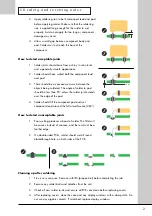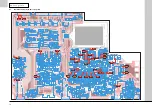
1
1.0 s a f e t y a n d s e r v i c i n g n o t e s
1.1
Safety precautions
1. This unit is Class II, which means that it is not connected to the protective earth system.
All live voltages are insulated from the case by double insulation.
2. Do not attempt to service unless qualified to do so.
3. Disconnect unit from AC power supply before removing cover.
4. Components marked with the symbol on the circuit schematic are safety critical
and must only be replaced with an identical component, or an alternative approved by
the manufacturer.
5. Switch unit off, and disconnect from supply before making and breaking any
connections.
6. Do not adjust any controls unless instructed to do so in this manual.
1.2
Electrostatic discharge precautions
Electrostatic discharge (ESD) is due to charges produced by insulating materials rubbing together.
Humans collect electrostatic charge through normal activities when clothes rub together and when
walking on carpet. This charge may be discharged suddenly when you touch a conductor. If the
conductor is connected to a sensitive electronic circuit, you may damage the components. It is also
possible to reduce the life of components without causing any obvious damage.
To prevent ESD damage, it is necessary to follow these guidelines.
1. Prepare work area. Place an ESD protective mat on the bench, strapped to the
protective earth circuit.
2. Prepare yourself. Put on an ESD protective wrist band, strapped to the protective earth
circuit, or to the ESD protective mat.
3. Keep all PCBs removed from unit in ESD protective bags.
4. Keep all replacement electronic components, PCBs and stock items in ESD protective
bags or boxes.
5. Be particularly careful with components marked with the following symbol:
1.3
Soldering
How to de-solder components
Components should be removed, wherever possible, using a de-soldering tool. Be careful not to
damage tracks and pads by applying too much pressure.
How to make good solder joints
1. Ensure surfaces are clean.
2. Keep soldering iron clean and wetted with solder. Use an appropriate bit. Do not leave
soldering iron on when not in use.
Содержание 8000S
Страница 1: ...service manual Integrated amplifier 8000S ...
Страница 24: ...24 7 0 c i rc u i t s c h e m a t i c s 7 8 Digital system controller schematic SCH26701 02 01 ...
Страница 25: ...25 7 0 c i rc u i t s c h e m a t i c s 7 9 Digital system interface schematic SCH26701 03 01 ...
Страница 26: ...26 1 7 0 c i rc u i t s c h e m a t i c s 7 10 1 Input interface schematic SCH26701 04 04 BZV86 2V0 ...
Страница 27: ...27 7 0 c i rc u i t s c h e m a t i c s 7 11 Relay coils schematic SCH26701 05 01 ...
Страница 28: ...28 7 0 c i rc u i t s c h e m a t i c s 7 12 Front panel schematic SCH26702 01 01 ...
Страница 29: ...29 7 0 c i rc u i t s c h e m a t i c s 7 13 Speaker outputs schematic SCH26703 01 01 ...




































